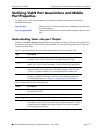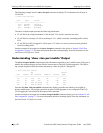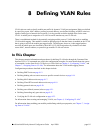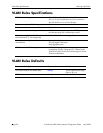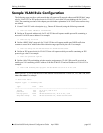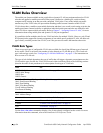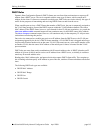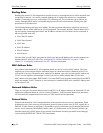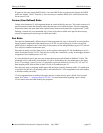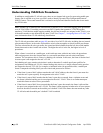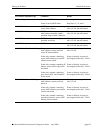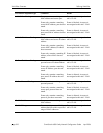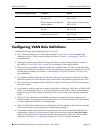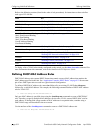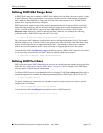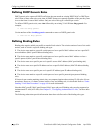
Defining VLAN Rules VLAN Rules Overview
OmniSwitch 6600 Family Network Configuration Guide April 2006 page 8-7
IP protocol rules also capture DHCP traffic, if no other DHCP rule exists that would classify the DHCP
traffic into another VLAN. Therefore, it is not necessary to combine DHCP rules with IP protocol rules
for the same VLAN.
Custom (User Defined) Rules
Custom rules determine VLAN assignment based on criteria defined by the user. The criteria consists of a
specified pattern of data and a location where that data must exist within the frame. Devices originating
frames that contain this same data in the required frame location are dynamically assigned to the VLAN.
Defining a custom rule is recommended only if none of the other available rules provide the necessary
criteria for capturing the desired type of mobile port traffic.
Port Rules
Port rules are fundamentally different from all other supported rule types, in that traffic is not required to
trigger dynamic assignment of the mobile port to a VLAN. As soon as this type of rule is created, the
specified port is assigned to the VLAN only for the purpose of forwarding broadcast types of VLAN traf-
fic to a device connected to that same port.
Port rules are mostly used for silent devices, such as printers, that require VLAN membership to receive
traffic forwarded from the VLAN. These devices usually don’t send traffic, so they do not trigger dynamic
assignment of their mobile ports to a VLAN.
It is also possible to specify the same port in more than one port rule defined for different VLANs. The
advantage to this is that traffic from multiple VLANs is forwarded out the one mobile port to the silent
device. For example, if port 3 on slot 2 is specified in a port rule defined for VLANs 255, 355, and 755,
then outgoing traffic from all three of these VLANs is forwarded on port 2/3.
Port rules only apply to outgoing mobile port traffic and do not classify incoming traffic. If a mobile port
is specified in a port rule, its incoming traffic is still classified for VLAN assignment in the same manner
as all other mobile port traffic.
VLAN assignments that are defined using port rules are exempt from the port’s default VLAN restore
status. See Chapter 7, “Assigning Ports to VLANs,” for more information regarding a port’s default
VLAN restore status and other mobile port properties.



